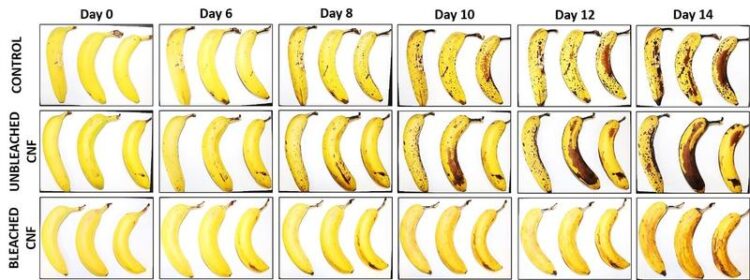Ecological coating for Bananas

Bananas with and without Empa coating in a shelf life test
Credit: Empa
Empa and Lidl Switzerland have jointly developed a cellulose protective coating for fruit and vegetables. The novel coating is made from so-called pomace – squeezed fruit and vegetable peels. The innovative project can reduce packaging and prevent food waste.
Plastic packaging in grocery stores protects fruits and vegetables from spoilage, but also creates significant amounts of waste. Together with the retailer Lidl Switzerland, Empa researchers have now developed a protective cover for fruit and vegetables based on renewable raw materials. For this project, Lidl chose Empa as a partner because Empa had decades of research experience with cellulose products.
Keeping fruits fresh at home
In Empa’s Cellulose & Wood Materials laboratory, the researchers then spent more than a year developing a special protective cellulose coating that can be applied to fruits and vegetables. The result: Coated fruits and vegetables stay fresh significantly longer. In tests, the shelf life of, for instance, bananas was extended by more than a week. This significantly reduces food waste. “The big goal is that such bio-coatings will be able to replace a lot of petroleum-based packaging in the future,” says Gustav Nyström, head of the Empa lab.
Production from press residues
The idea is to process so-called pomace into fibrillated cellulose. Pomace is the solid residue left over after extracting the juice from fruit, vegetables or plants. Previously, this plant leftover was disposed of in biogas plants or directly on the field; in the future, it will be used to create a protective coating for fresh fruit. The coating is either sprayed onto the fruit or applied to the produce as a dip and is easy to wash off. As it is harmless to the consumer, it can also be consumed without harm. The potential of cellulose coatings is by no means exploited yet; there is the possibility of adding additives such as vitamins or antioxidants.
Throughout the country
In summer, the highly promising preliminary study, which has been ongoing since 2019, was successfully completed and the main study launched. The cellulose layer developed at Empa will be tested and further improved over the next two years together with Lidl Switzerland and a fruit and vegetable supplier. The project is supported by Innosuisse, the Swiss innovation agency. The aim is for the new technology to be used in all 150 Lidl stores throughout Switzerland following the successful main trial.
Wissenschaftliche Ansprechpartner:
Dr. Gustav Nyström (Cellulose coating)
Cellulose & Wood Materials
Phone +41 58 765 4583
Gustav.Nystroem@empa.ch
Editor / Media contact
Rainer Klose
Empa
Communication
Phone +41 58 765 4733
redaktion@empa.ch
Corina Milz
Lidl Switzerland
Communication
Phone +41 71 627 82 00
media@lidl.ch
Originalpublikation:
L Amoroso, KJ De France, CI Milz, G Siqueira, T Zimmermann, G Nyström; Sustainable Cellulose Nanofiber Films from Carrot Pomace as Sprayable Coatings for Food Packaging Applications; ACS Sustainable Chem. Eng. (2021); DOI: 10.1021/acssuschemeng.1c06345.
https://doi.org/10.1021/acssuschemeng.1c06345
Weitere Informationen:
Media Contact
All latest news from the category: Ecology, The Environment and Conservation
This complex theme deals primarily with interactions between organisms and the environmental factors that impact them, but to a greater extent between individual inanimate environmental factors.
innovations-report offers informative reports and articles on topics such as climate protection, landscape conservation, ecological systems, wildlife and nature parks and ecosystem efficiency and balance.
Newest articles

New model of neuronal circuit provides insight on eye movement
Working with week-old zebrafish larva, researchers at Weill Cornell Medicine and colleagues decoded how the connections formed by a network of neurons in the brainstem guide the fishes’ gaze. The…

Innovative protocol maps NMDA receptors in Alzheimer’s-Affected brains
Researchers from the Institute for Neurosciences (IN), a joint center of the Miguel Hernández University of Elche (UMH) and the Spanish National Research Council (CSIC), who are also part of…

New insights into sleep
…uncover key mechanisms related to cognitive function. Discovery suggests broad implications for giving brain a boost. While it’s well known that sleep enhances cognitive performance, the underlying neural mechanisms, particularly…



